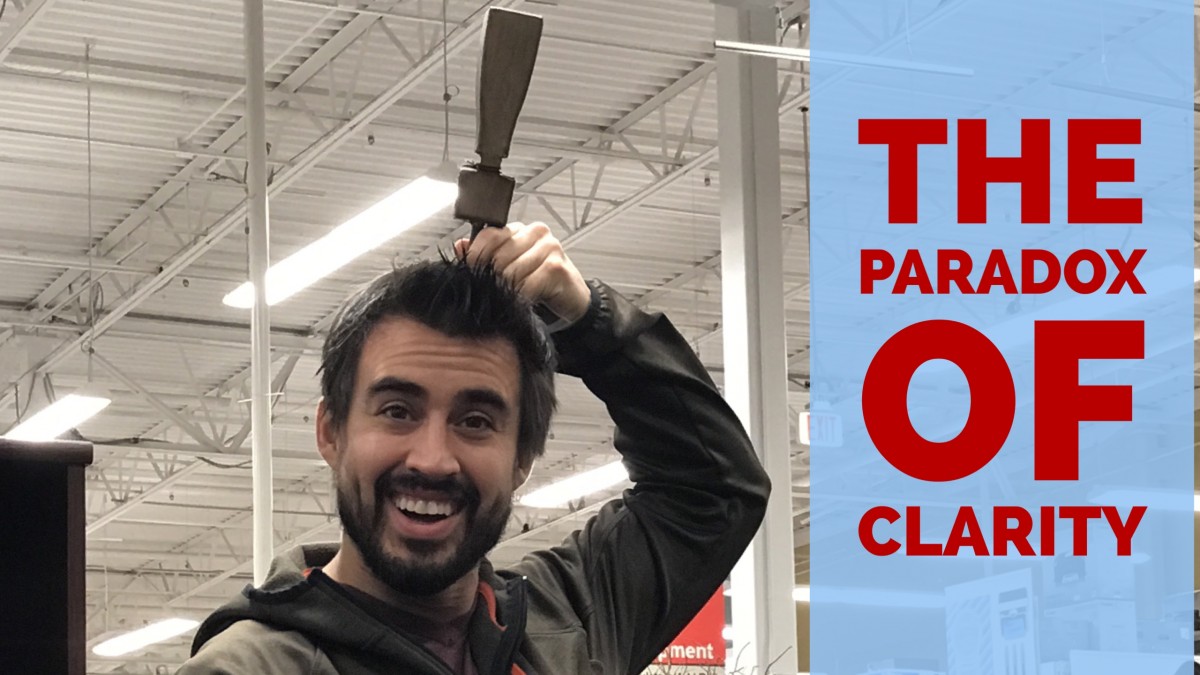The Paradox of Clarity
Stuart McMillan is a world-renowned speed coach who has worked with dozens of Olympic-calibre athletes, including 2016 Olympics 100 and 200 m medalist Andre De Grasse.
McMillan took to Twitter and asked an insightful question:
“Is what we are currently doing still aligned with our purpose?”
Before you answer his question, let me ask you this: Do you even know what your purpose is? Your purpose in life? Your purpose in your relationship? Your purpose for showing up to the gym 3, 4, 5 days a week? My guess is many of you don’t think about your purpose.
Why is it important?
Heidi Barker, aka Heidi the Healer is a mental coach who works with elite athletes—including many top-level CrossFit Games athletes like Josh Bridges and Lauren Fisher—to discover their purpose.
Instead of using the word purpose, though, she uses the word why?
Specifically, Barker challenges her athletes to discover their WHY MISSION STATEMENT.
Why do you compete?
Understanding your why, or your purpose, in anything you do in life is crucial to your success and your happiness, she explained. And sometimes it takes a lot of agonizing deep-thinking to reveal what you’re truly after.
Her own mission statement is quite simple: “Being of service.”
Once you understand your why you can start to gain clarity of your goals. And once you have clarity of your goals and what it is you truly want, it’s easier to take the appropriate action to achieve whatever it is you’re after.
“Whenever there’s a broken moment, usually it means the athlete has lost sight of their goals, and then we need to go back to the mission statement and re-evaluate,” she said.
This is what McMillan was talking about in his tweet. Although coming up with your purpose, or your why mission statement, might take some hard mental and emotional work, unfortunately, your work is never done!
Each day—or let’s say each week or even each month—it’s important to remind yourself, and re-assess your vision/mission/purpose/why mission statement. Are the actions you’re taking still in line with your purpose?
Without these daily reminders and constant assessment, we risk falling into what Greg McKeown, the author of Essentialism: The Disciplined Pursuit of Less, calls the clarity paradox:
CLARITY PARADOX:
Phase 1: When we really have clarity of purpose, it leads to success.
Phase 2: When we have success, it leads to more options and opportunities.
Phase 3: When we have increased options and opportunities, it leads to diffused efforts.
Phase 4: Diffused efforts undermine the very clarity that led to our success in the first place.
In other words, success can be a catalyst for failure, or at least for stunting personal and athletic growth if our efforts become diffused and we stop taking actions that are in line with our purpose.
Or if our purpose changes, but we fail to realize our purpose has changed, for that matter.
The solution: McKeown suggests the following:
- Use more extreme criteria:
Think about your closet full of clothes you never wear, a closet that’s bursting at the seams. What if you went through each article of clothing and got rid of anything you haven’t worn in the last year?
Suddenly, your closet looks a lot more organized when you keep only the things you love while eliminating clutter to make space for something better.
You can do the same in life, in your career, or at the gym by applying tougher criteria and accepting only the best. If you’re looking for a job, for example, ask yourself what you’re deeply passionate about. What taps into your best talents?
There likely won’t be as many opportunities for jobs once you weed out the ones you don’t want, but you’re going to end up with a better pool of opportunities. Same goes for scrolling through Tinder. Stop swiping right so often and you’ll end up with better quality matches that will help you keep sight of your ultimate goal/purpose.
2. What is essential?
Ask yourself the question What is essential? And then eliminate the rest. Figure out what ideas are important for you to pursue, and throw away the rest. This will give you the clarity you need to stay focused on your purpose.
In sum: Success can catalyze failure because it leads to a reckless pursuit for more, so shift your focus to being more of a disciplined pursuit of less (but of higher quality). And constantly reassess your purpose, demand more and eliminate non-essentials to keep your focused on your prize.







